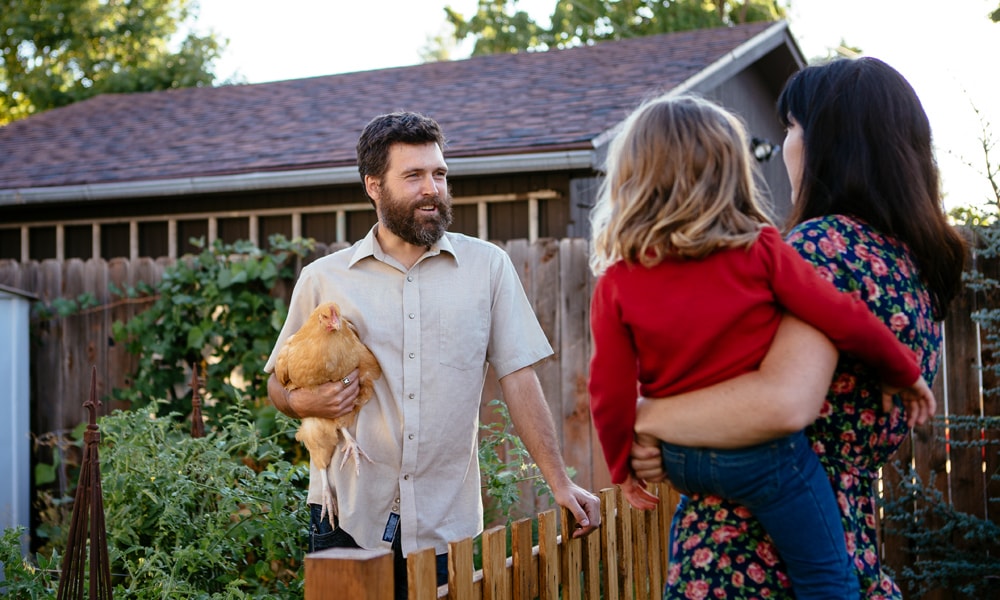Neighbors
Learn to talk about your neighbors and surrounding community.

Part 1
Warm-up
Answer the questions
Do you know your neighbors?
How often do you see your neighbors?
Part 1
Grammar (adjective)
Adjectives are words that describe nouns or pronouns. They tell us about their size, shape, age, color, origin or material,…
Adjective + Noun
In most cases adjectives come in front of nouns:
- It’s a big table.
- They have a beautiful house.
- He’s a good man.
Linking Verb + Adjective (no noun)
Linking verbs are non-action verbs such as ‘be‘, ‘become‘, ‘feel‘ and ‘seem‘ that connect the subject with words that describe it (adjectives).
Adjectives that follow linking verbs do not need nouns.
- The table is big.
He is tall.
She seems happy.
They were rich.
Describe the subjects of the pictures using adjectives. Make sentences with an adjective after the verb ‘be‘ and sentences with an adjective before the noun. The first one is done for you.
:strip_icc()/GettyImages-1163331995-f5226107e4794ed5b334c23215ed28db.jpg)


=> 1) This a a black dog
=> 2) _____________________
=> 3) _____________________
Read the given sentences below and circle the adjective
- The homeless beggar hasn’t eaten in days.
- The fox is a sly animal.
- Mary had a little lamb.
- The selfish giant didn’t allow the children to enter his garden.
- The foolish dog barked at its reflection and lost its food.
- The family didn’t have enough food for the winter.
- The girl is a state-level boxer.
- The brave army marched through the streets.
- I had no idea such a fantastic place existed.
- Some oranges are pretty sour.
Answer
- Homeless
- Sly
- Little
- Selfish
- Foolish
- Enough
- State-level
- Brave
- Fantastic
- Sour
Part 3
Vocabulary
Read the word, its’ meaning, and the examples
Then make up your own sentences using the word.
Student can skip the words they already know.
neighborhood
/ˈneɪbərhʊd/

the area of a town that surrounds someone's home, or the people who live in this area
There were lots of kids in my neighborhood when I was growing up.
They live in a wealthy/poor/friendly neighborhood.
landlord
/ˈlændlɔːrd/

a person or company from whom you rent a room, a house, an office, etc
The landlord agreed to fix the fridge in the kitchen as soon as I notified him about the issue.
considerate
/kənˈsɪdərət/

kind and helpful
It wasn't very considerate of you to drink all the milk.
My friend is considerate; she always shares her toys.
polite
/pəˈlaɪt/
behaving in a way that is socially correct and shows understanding of and care for other people's feelings
He was too polite to point out my mistake.
gossip
/ˈɡɑː.səp/

to talk about other people's private lives
Stop gossiping and do your work.
generous
/ˈdʒen.ər.əs/

giving or willing to give freely; given freely
He was generous to his friends and family.
reliable
/rɪˈlaɪəbl/

that can be trusted to do something well; that you can rely on
We are looking for someone who is reliable and hard-working.
messy
/ˈmesi/

dirty and/or untidy
The children got really messy playing in the woods.
supportive
/səˈpɔːrtɪv/

encouraging somebody or giving them help or sympathy
He was strongly supportive of my career.
Make up your own sentences using the words.
Part 4
Reading and discussion
Imagine you’re a landlord of a small building. This week there is one available flat, and you have 3 people or groups of people interested. Here are the choices, discuss them with your teacher and choose which one you like to be your neighbors?
Tom and Paula Stereoblast are polite neighbors recommended by my dad, so they’re probably considerate and won’t cause big problems. They’re nice but want to be singers, which could mean a lot of music and noise.
Jim Scrum’alf is a reliable guy with a great job, and he’s quiet and responsible. But he’s a soccer player, and I’ve heard some can be messy and not very tidy. It’s a risk whether he’ll be a good neighbor or not.
The Happy family is new to the neighborhood. They seem generous and supportive, and their son could be a friend for my child since they’re the same age and share interests. However, the mom talks a lot and seems to enjoy gossip, which worries me. She might be too curious and like to spread rumors.
Sample answer
After considering all factors, I might lean towards choosing Jim Scrum'alf. His quiet and responsible nature are highly valued traits in a tenant, and the concern about him being messy is less significant compared to the potential noise from Tom and Paula or the gossip from the Happy family’s mother. It's important to maintain a peaceful and respectful environment in the building.
Part 5
Listening 1
People are talking about their neighbors. Listen and circle each person’s opinion.
Click to play the Audio
Bob thinks his neighbor is ___________
- fun
- inconsiderate
Jin-suk thinks his neighbors are ___________
- strange
- nice
Jennifer thinks her neighbor is ___________
- unfriendly
- shy
Douglas thinks his neighbor is __________
- hardworking
- nosy
Susan thinks her neighbor is __________
- helpful
- lonely
Robert thinks his neighbors are __________
- responsible
- cheap
Sample answer
1B
2B
3A
4A
5A
6B
Transcript
1
I just got a new neighbor in the apartment upstairs from me. I haven’t met her yet. But I can hear her TV set every night because she turns the volume up really high. She should really be more considerate of her neighbors.
2
The house across the street from mine was sold last month, and a young family moved in. I think they’ll really fit in well here. They’ve already invited all their neighbors to a cook out at their house next week. They seem like really nice people.
3
The man who lives next to me is moving. I can’t say that I’m too upset about it. He’s lived next to me for almost five years, but I don’t think he’s spoken to me more than three or four times. Sometimes I’ll wave to him in the morning and he doesn’t even wave back
4
My neighbor Stacy is incredible. You wouldn’t believe all the things she manages to get done. She works at a big law firm downtown and works really long hours. She also volunteers on the weekends. To top it off, her house is always spotless! I honestly don’t know where she finds the time.
5
I’m really lucky to have Bob as a neighbor. He works in construction, and he’s always nice about giving me a hand whenever I have work to do around the house. He doesn’t really cook so I try to fix him a home-cooked meal every now and then to thank him.
6
I bought this house last year and I love it. My next door neighbors are the only problem. They have two young boys who like to play baseball in my yard. Last month they accidentally broke my window. The boys apologized, but their parents didn’t even offer to pay for the damages. Can you believe that?
Listening 2
People are describing their neighbors. Is each statement true or false? Listen and check (✓) the correct answer.
Click to play the Audio
| True | False | |
| 1.a. She doesn’t like her neighbor now | ⬜ | ⬜ |
| 1.b. Her neighbor is elderly. | ⬜ | ⬜ |
| 2.a. He trusts his neighbor. | ⬜ | ⬜ |
| 2.b. His neighbor still watches his children. | ⬜ | ⬜ |
| 3.a. Her neighbor is often impolite to her. | ⬜ | ⬜ |
| 3.b. he understands why her neighbor never accepts her invitations. | ⬜ | ⬜ |
| 4.a. The man has always disliked his neighbor | ⬜ | ⬜ |
| 4.b. The man has tried to speak to his neighbor about the problem. | ⬜ | ⬜ |
Sample answer
1 False, True
2 False, False
3 False, True
4 False, True
Transcript
1
So I have this neighbor, Mr. Cartwright. He’s an elderly man, retired. Anyway, I used to think he was really nosy because he sits on his porch all day and watches the people in the neighborhood. It used to really bother me. But then I went on vacation last year and someone tried to break in to my house while I was gone. Mr. Cartwright saw them and called the police right away. Now I’m glad to have someone like Mr. Cartwright in the neighborhood. It’s good to know that someone’s watching out, you know?
2
Nancy is my next door neighbor. She used to watch our children whenever my wife and I had to work late. I always thought she was someone you could really count on, and I never worried about leaving the kids with her… until last year. I had to work late and my wife was on a business trip. So I asked Nancy if she would mind picking up the kids from day care and she said okay. But later that day I got a call from the day care saying that the kids had been waiting there for two and a half hours! She completely forgot about them! Now I just don’t think I can trust her.
3
When Dr. Woo first moved into the neighborhood, I didn’t think very much of him. I invited him to a couple of neighborhood events – uh, barbecues, dinner parties, you know – but he would always decline. He was never rude about it, but he didn’t seem very interested in getting to know his neighbors. I just figured that he was kind of arrogant. Later, however, I found out that he spends all of his free time volunteering at a free health clinic downtown. That’s why he never comes to any neighborhood events. He just doesn’t have time.
4
I really can’t stand my neighbor Gary now. The funny thing is, that wasn’t always the case. I used to get along with him really well. He seemed like a quiet, polite guy. He was friendly but minded his business. Just generally a good neighbor, you know? But in the last year or so he’s gotten a new hobby – repairing and riding old motorcycles. And these things are so loud. He’ll get up around 6:30 or 7 a.m. on a Saturday and start working on one of his motorcycles… like fixing the engine and then testing it. He wakes up half the neighborhood. I’ve talked to him about it before, but he just won’t listen.
Part 6
Discussion
Let’s use the vocabulary you’ve learned during the lesson and talk about the following topics/questions freely!
Teacher helps student expand and correct the answers
Do you know your neighbors? Do you get on well with them?
Do you often visit them, or do they visit you?
Are they similar people to you, for example are they the same age, or do they have the same interests?
What qualities do you think make a good neighbor?
Have you ever borrowed something from a neighbor?
Do you prefer quiet neighbors or ones who are social?
Have you ever been to a neighbor’s house for a meal?
Do you have any positive or negative experience with a neighbor? If yes, pls share.
In your country, do people like to be close friend with their neighbors? Or they just want to maintain a social relationship with them?
Sample answer
- Yes, I know my neighbors quite well and we generally get along nicely. We often greet each other and have friendly chats.
- We visit each other occasionally, mostly during holidays or special events. It's not very frequent but always pleasant when it happens.
- Some of my neighbors are around the same age as we are, and we share similar interests, especially in gardening and local community events.
- Good neighbors are respectful, friendly, and helpful. They respect your privacy but are there when you need assistance.
- Yes, I have borrowed tools and kitchen items from my neighbors occasionally. It's handy and fosters a good relationship.
- I prefer quiet neighbors who are also approachable and social when the occasion arises. It's nice to have a peaceful environment but also community interaction.
- Yes, I've been invited to a neighbor’s house for meals a few times. It's always a great opportunity to bond and enjoy different cuisines.
- I've had mostly positive experiences with my neighbors. We support each other during tough times, like when one family needed emergency childcare.
- In my country, it varies, but many people prefer to maintain a friendly, social relationship without becoming too close. It balances privacy with community spirit.
Review
Let’s review the lesson with teacher
Vocabulary in the lesson, adjective talk about the personalities
Discuss about your neighbors
See you next lesson
Homework
Do homework
Describe your neighbor
Objective: To practice simple sentences describing someone you know.
Instructions:
- Describe your neighbor: Write three sentences about a neighbor. Use simple adjectives like kind, noisy, friendly, polite, generous, messy, reliable, supportive,….
- One good thing: Write one sentence about something good this neighbor has done.
One wish: Write one sentence about something you wish you could do with your neighbor (like play a game or borrow something). - Record: Record your voice and send it to teacher to review your practice
Example:
- My neighbor is very friendly. She has a big white dog. Her house is always noisy.
- She helped my family when we needed sugar for baking.
- I wish I could learn how to garden with her.

